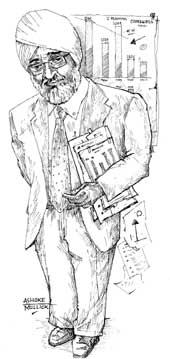|
|
Planning Commission deputy chairman Montek Singh Ahluwalia is an avid reader of military history. That certainly doesn’t square with his present stint where he comes across as being in mortal fear of taking combative positions and going out of his way to please everyone. Only he ends up displeasing everyone.
Take the approach paper to the Eleventh Five Year Plan, which goes for the approval of the National Development Council today. The document has leftist politicians and economists as well as liberal economists gunning for him. The former say it reflects Ahluwalia’s obsession with growth and reforms; the latter say it is a confused document.
So has one of the poster boys of economic reforms been eclipsed by the office of the deputy chairman? Yes, says an economist, who thinks he is a misfit in his present position, which requires him to be a political animal. “He has not compromised his views, merely diluted his articulation of them.”
The colour of his trademark reverse-tied turban (left over right, instead of the other way around) may have changed from socialist pink (earning him the Pink Sikh sobriquet during his World Bank days) to conservative blue, but there’s been no ideological flip flop. He was and remains committed to classical liberal economics. The blue turban, incidentally, is apparently just a matter of convenience — a journalist spotted him in green on a holiday — because it’s easier to match with different outfits.
Ahluwalia’s focus on poverty reduction isn’t something he acquired to suit the present government. During his stint at the World Bank between 1968 and 1979, he did what even his critics describe as path-breaking work on poverty and inequality as well as redistribution and growth, along with economists Hollis B. Chenery and Nicholas G. Carter.
That isn’t the only misconception about him. The 63-year-old Delhi Public School-St Stephens-Oxford alumnus is often referred to as Dr Ahluwalia. Only, he’s never done a PhD. His economist wife Isher Judge Ahluwalia, as a much-circulated story goes, once answered the phone and, when the caller asked to speak to Dr Ahluwalia, specifying Montek, retorted: ‘There is only one Dr in this house and that is me.’
The devoted family man apparently wanted his children — two sons — to grow up in India and in 1979 he returned to become economic adviser in the finance ministry when Manmohan Singh was finance secretary. The two had met in the early 1970s at a mutual friend’s house and had bonded well. It’s this 30-year friendship that gives Ahluwalia the unique position of being the Prime Minister’s most-trusted aide. Soon after returning, Ahluwalia resigned from the Bank (instead of prolonging continuing his lien), putting an end to all chances of a comfortable Bank sinecure.
Since then, he’s been at the forefront of economic policy making, especially since he moved into Rajiv Gandhi’s Prime Minister’s Office. Much of the foundation of the economic reforms initiated in 1991 came from a note Ahluwalia wrote, in his private capacity, for Gandhi when the latter was out of power.
But the entire trade policy reform was done only by then commerce minister P. Chidambaram and then special secretary A.V. Ganesan; Ahluwalia, though the commerce secretary, was out of the loop. Once he moved to the finance ministry to work under Manmohan Singh, though, he worked steadily to push the reforms agenda forward over the next seven years, working under three finance ministers.
His reformist zeal has often got the red and saffron brigades united against him, whether it was over his championing of the disastrous Enron project and the reported scuttling of the mid-term appraisal of the Eighth Plan because it was highly critical of the reforms process when he was finance secretary or the report of the Task Force on Employment that he authored when he was Planning Commission member during the NDA government. His effigies were burnt in protest against that report, which argued persuasively for labour law reform. He doesn’t like being reminded of these three issues now.
His love for military history probably comes through in what critics say are his wily strategist moves, quietly sidelining inconvenient colleagues and often stumping his critics with unexpected and smart manoeuvres. Witness the way he had the left parties seething helplessly when he quietly disbanded all consultative committees for the mid-term appraisal of the Tenth Plan, following objections about the inclusion of representatives of international funding organisations.
“He makes sure he does exactly as he pleases, though he doesn’t alienate anybody and doesn’t get anyone upset,” says an associate who’s not exactly a fan but who has never seen him lose his temper.
That’s probably why he’s enjoyed the confidence of various prime ministers. He continued in the PMO under V.P. Singh and was on good terms with Atal Bihari Vajpayee as well. His survival in the present government, despite antagonism from the Left and elements within the Congress, has a lot to do with the fact that he enjoys Sonia Gandhi’s trust — not many know that he has been involved in mentoring Rahul Gandhi in public policy.
Clearly there are certain things that are kept far away from the media, though he is on good terms with it. Like his private life. Not a single Delhi paper came to know about the recent wedding of his son at Neemrana Fort (only for family and friends) and the reception at his well-appointed Aurangzeb Road residence.
Few doubt Ahluwalia’s intellectual prowess or razor sharp mind. A former finance ministry official recalls Ahluwalia, then secretary, economic affairs, strolling into his office while the Economic Survey was being prepared, reading the first chapter (he’s a super fast reader), then sitting down at the official’s table and rewriting the whole chapter in long hand. The long hand of finance, though, could do with some direction. After all, even a military strategist should know when to pull the trigger.











